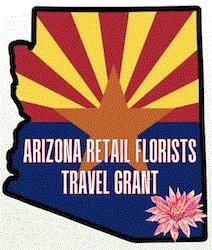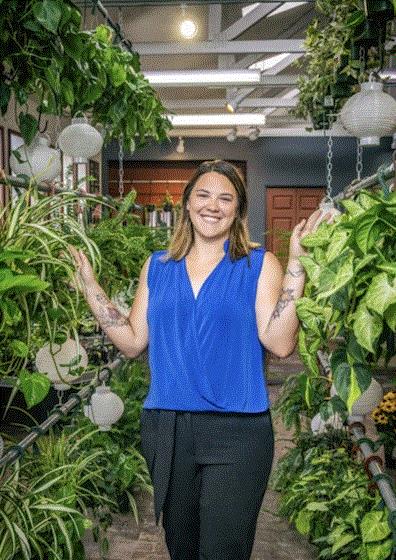Hort Students, Your First Assignment
This is for all you students who are in their first few weeks of a new semester and eager to learn all the things. Your first assignment is to apply for two American Floral Endowment (AFE) internship programs—the Vic & Margaret Ball Internship Scholarship Program and the Mosmiller Intern Scholarship Program.

Which is right for you? Well, I’ll explain the differences and you pick which is up your alley.
The Vic & Margaret Ball Intern Scholarship Program will give you experience in a commercial production greenhouse or nursery. And you’ll get paid for it, too. The program offers internships in three, four or six-month lengths and provides scholarships of up to $6,000. And your faculty advisor can be reimbursed up to $1,000 in traveling expenses to visit you at your internship location. Sweet!
The Mosmiller Intern Scholarship Program is for students pursuing a career in retail or wholesale operations. Another paid internship, the Mosmiller program offers 10-16 week internships and provides scholarships of $2,000.
Trust us, students—internships are the best way for you to gain real, hands-on experience that’ll help you practice and expand your knowledge. Applications for both intern opportunities are due October 1. Apply HERE.

Money for Pros, Too
AFE has some funding opportunities for those elbow-deep in the floral department, too. They have three grants for retail florists to reimburse folks for educational floral industry events, courses or webinars. Those three grant opportunities are:
Arizona Retail Florist Travel Education Grant. If you are an owner, manager or employee of a traditional retail florist with a brick-and-mortar storefront in Arizona and you are traveling to an event outside of the state, then you may be eligible for the $1,000 grant. There are a few exceptions as to the traveling requirement, but you can find out more about the grant and apply for it HERE. The intent of this grant is to expand an applicant’s attendance beyond events they regularly attend and potentially share their expanded knowledge with their industry peers in Arizona.

Ken and Jean Royer Family Fund – Retail Florist Education Travel Grant. This travel grant is open to all retail florist in the U.S. and is designed to help folks with ongoing education and networking at industry events, particularly for individuals who might face financial barriers to participation. Traveling helps to open your mind to new possibilities—in business and in life! To be eligible for this grant, you must be a first-time attendee of the conference you plant to attend and either work in or own a traditional brick-and-mortar retail floral shop. Find out further details and requirements HERE.
The Retail Florist's Continued Education Grant. Open to Retail Florists in the Maryland, Virginia and Washington, D.C., areas, this grant provides an annual reimbursement to retail florists to continue their education through in-person industry events, community courses or webinar classes. This grant was established by Bob and Carol Sharpe, retired third-generation florists from Frederick, Maryland. These will be reimbursement grants for individual business-related courses. Each grant will cover half of the conference registration and travel fees, with a maximum award of $2,000. Learn more about the course completion and application process HERE.
Again, applications for these three travel grants are due October 1! Find out more HERE.

Speaking of Arizona …
Arizona is the home state of the 2024 Green Profit/The Garden Center Group Young Retailer Award winner McKenzie Lain of Watters Garden Center in Prescott. And she’s the cover story for the September issue of Green Profit, which should be arriving in your inboxes any day.

Or, read up on McKenzie and what about her compelled our YRA judges to declare her this year’s winner in the ONLINE version of the magazine. Pay attention to how a degree in Marriage and Family Counseling can be applied to running a business—it’s genius. Worth the cost of admission!
Important H-2A Program Update!
This update comes to you from GrowerTalks’ Editor Jen Zurko.
Earlier this year, 17 states and two organizations filed suit against the Department of Labor (DOL) over the final H-2A rule titled Improving Protections for Workers in Temporary Agricultural Employment in the United States (Final Rule). The Final Rule was set to go into effect on Thursday, August 29, 2024.
Right before the deadline, a federal court found that the Final Rule violates the National Labor Relations Act (NLRA) as it attempts to unconstitutionally create law, infringing upon Congressional authority. It also found that DOL’s actions were not deemed in “accordance with law” as required by the APA. While the DOL may assist Congress, it may not become Congress. The Court found that DOL has attempted to create rights that Congress has not legislated, such as a right to collective bargaining for agricultural workers.
Further, the Final Rule would cause financial harm to both the plaintiff states and plaintiff organizations, including increased administrative costs for state workforce agencies and employers, as DOL anticipates that changes to the annual effective date of new Adverse Effect Wage Rates could cost farms nationwide between $12 and $20 million over the next 10 years. These findings align with the Eleventh Circuit’s ruling that “unrecoverable monetary loss is an irreparable harm.”
Based on these findings, the Court ruled that the Final Rule violates the NLRA as it attempts to unconstitutionally create law, infringing upon Congressional authority. The DOL’s actions were not deemed in “accordance with law” as required by the APA. However, the Court decided not to grant a nationwide injunction and the injunction applies only to the plaintiffs.
Since the ruling, DOL has put forward a statement announcing the delay in the Transition Schedule for Implementing the H-2A Application and Job Order Associated with the 2024 Farmworker Protection Final Rule.
The Court’s ruling now prevents DOL from enforcing the Farmworker Protection Rule in the states that filed the suit: Georgia, Kansas, South Carolina, Arkansas, Florida, Idaho, Indiana, Iowa, Louisiana, Missouri, Montana, Nebraska, North Dakota, Oklahoma, Tennessee, Texas and Virginia. Because of this injunction, DOL cannot enforce the Farmworker Protection Rule in the specified states and entities while the injunction is in place.
The FLAG (Foreign Language Application Gateway) system is not set up to identify and process applications differently based on which state the application originated. Consequently, the DOL has delayed updating the FLAG system (IN ALL STATES FOR THE TIME BEING) and will continue to process applications according to the previous forms.
“The Department of Labor’s delay in implementing the H-2A Worker Protection Rule, prompted by the recent Georgia case decision, highlights the concerns regarding the rule’s suitability and the perceived haste in its advancement,” said Matt Mika, AmericanHort’s VP of Advocacy & Government Affairs. “AmericanHort is committed to collaborating with the Department of Labor to develop an H-2A Rule and program that effectively serves current and prospective participants.”
For AmericanHort members, the organization has developed FAQs to summarize the court ruling and what it means for those members who participate in the H-2A program. AmericanHort has also been working with outside legal counsel Lynn Jacquez and Shawn Packer of JPH Law Firm. AmericanHort will continue to follow developments on the H-2A Final Rule closely with guidance from their outside counsel to ensure members have the tools and resources needed to remain compliant with federal rules and regulations as they’re issued.
(Reminder that AmericanHort premium members are eligible to receive initial legal opinions and compliance access to expert legal advice related to workforce issues from AmericanHort partner JPH Law. If you aren’t a premium member and would like to become one, visit AmericanHort.org to upgrade your membership.)
Thanks, JZ!

Heat Injury and Illness Prevention
Speaking of government goings on and AmericanHort, I read in a recent email from their Advocacy Team that the Occupational Safety and Health Administration (OSHA) has offered up a new standard relating to heat injury and illness. The Heat Injury and Illness Prevention in Outdoor and Indoor Work Settings standard addresses heat issues in a number of industries, including agriculture. The standard will require employers to develop a comprehensive plan to evaluate and manage heat-related risks in the workplace.

With much of the country having experienced hotter-than-Hades weather this summer, here are a few aspects of this proposed rule you might want to be aware of:
-
The standard applies to all employers in covered sectors where OSHA has jurisdiction, except for specific exceptions outlined in the rule.
-
Employers will need to create a plan that identifies heat hazards and implements controls to protect workers.
-
The standard aims to provide clearer guidelines on the necessary measures to safeguard employees from heat-related injuries and illnesses.
AmericanHort is reviewing the rule and will update members as the rule moves forward. Questions or comments about this? Send them along to Matt Mika.

Trends in Shopping
Ball Horticultural Company’s Marvin Miller knows I am always looking for interesting content to share with the buZZ audience. The latest retail-related content Marvin shared came from the folks at FedEx. It was the report, “From Screens to Brick-and-Mortar: 5 Trending Shopping Behaviors Driving In-Store.” Good stuff! I will share one or two of these trends each week.
But first, I’d like to start with information from a chart at the report’s beginning.
Why Customers Choose to Shop In-Store:
-
Opportunity to See and Touch Items: 37%
-
Immediacy of Receiving the Product: 27%
-
Shopping Experience: 24%
-
Product Availability: 22%
-
Product Quality: 22%
-
Customer Service: 19%
-
Convenience: 17%
-
Simple Return Process: 16%
-
Product Variety: 16%
My comment on this is I guess it depends on what you’re shopping for. Produce? I want to pick my own. Paper products, health care items and housewares? Deliver to my door, please. Even the immediacy of receiving products is now tipping to delivery (I ran out of my daily collagen this morning and Amazon delivered it before noon). Again, it all depends on what you are shopping for, and the respondents who answered the question above should probably have been prompted to think about the same product, and the question should have been asked separately for different categories.
But back to the trends. The first trend they mention is Placemaking and Curating Experiences. For many of us, crafting spaces that “go beyond utilitarian needs to foster social interaction” is our jam. Look at the aforementioned Watters Garden Center and also Bauman Farms and Green Profit columnist Amanda Thomsen’s Aster Gardens. Key to placemaking is diversifying experiences to give consumers multiple reasons to visit. Plants! Classes! A café! Experiences! Outdoor living! Design! Gifts!
What’s your take on this FedEx shopping trend? Drop me a note about it HERE.

B&B Buys Tilly
Bower & Branch, the online marketplace for independent growers to sell trees and plants direct to consumers, has just acquired a company called Tilly, an online landscape design firm, with the goal of vertical integration. In other words, customers will be able to shop for trees and shrubs online, and then have their landscape professionally designed for those plants. Folks could even get it professionally installed, too.
“The future of this industry is online, and our investment in Tilly supports that in a big way,” stated Don Eaton, Chief Executive Officer of Bower & Branch in a press release on the topic. “In addition to their professional expertise and leadership, Tilly brings value through its proprietary technology and access to new markets, serving our business model and grower network well.”

Established in 2019, Tilly is a female-founded, online landscape design company servicing homeowners and landscape professionals throughout the U.S. Developed by a nationally recognized landscape architect, Tilly’s innovative remote-first approach matches customers with a vetted and trained landscape designer. The result is a custom plan designed to meet specific needs and environmental conditions. I’m thinking this is a bit like Angi, formerly Angie’s List, but for landscape and the service is conducted 100% online.

“Tilly has dedicated the last five years to mastering and scaling online landscape design. Following our customers’ lead, we are excited to solve their next major pain point—plant fulfillment,” says Alexis Sutton, Chief Executive Officer of Tilly. “An overwhelming majority of the homeowners we serve also want us to fulfill their plant orders, making this a significant growth opportunity. Tapping into Bower & Branch’s extensive grower network and curbside delivery service will allow us to seamlessly bring their design vision to life.”
Tilly’s CEO Alexis Sutton, CMO Sarah Finazzo and Design Director Cate Singleton will transition to Bower & Branch, with Alexis becoming President of the combined entity and focusing on the expansion of the PRO network across the country, and Sarah becoming Chief Communications Officer.
Bower & Branch was founded by Don Eaton while managing his family’s 175-acre farm in Pennsylvania. He spent years studying the industry and recognized the need to digitize grower inventories for sale online. Bower & Branch specializes in trees that can’t be shipped in a box but are instead delivered via an extensive trucking network. Their product includes bulk plant orders and trees up to 30 ft. tall, which are delivered from their grower network to the homeowner’s curb.








Questions, comments, suggestions? Drop me a line if you'd like at ewells@ballpublishing.com.

Ellen Wells
Senior Editor
Green Profit
This week's BuZZ! was sent to 27,588 loyal readers!
If you're interested in advertising on BuZZ! contact Kim Brown ASAP!